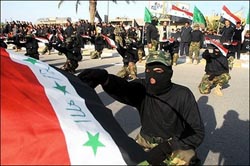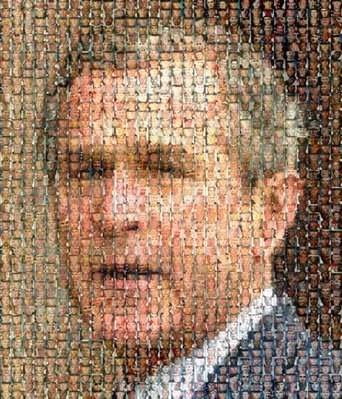by Tonya Maxwell Chicago Tribune 30 November 2006
CHICAGO - In the four weeks since his death, strangers have come to their own conclusions about Malachi Ritscher.
He has been pegged as a courageous war protester. Or a man of convictions. Or a depressed, suicidal loner. Or a conflicted soul, plagued by a little of each.
On a crisp morning earlier this month, he focused a video camera in a wide shot of the “Flame of the Millennium” statue, officials familiar with the case said.
He walked into the frame wearing a hooded sweatshirt and a skull mask, then climbed onto the base of the 25-foot abstract sculpture. In front of him, Kennedy Expressway commuters rushed past the banner he had planted near the Ohio Street exit.
“Thou Shalt Not Kill. As Ye Sow So Shall Ye Reap” it read in black ink, and below that, the words “Your Taxes Buy Bombs and Bullets” penned in red.
Ritscher, 52, pulled a United States flag from a container and draped it over his head and shoulders.
He struck a flame and in that moment, became one of only a few dozen people to die by self-immolation in the United States.
He also started a debate about what motivated him to take his life.
One month after Ritscher’s death, on Sunday at 2 p.m., a small, loose-knit group of activists calling themselves I Heard You, Malachi plans to gather at Grand Avenue and Peoria Street to commemorate his death.
Organizer Jennifer Diaz did not know Ritscher but was inspired by his message, saddened by what he did.

“I don’t know what to say about the idea of taking one’s life for a cause, except when it happens, it should not be ignored,” the 28-year-old graduate student said. “It was an act of communication about war and about himself, about how he felt about things. I want people to hear that message.”
Friends and family have tried to make sense of Ritscher’s decision to die by self-immolation.
They have no doubt he wholeheartedly opposed the war in Iraq and believe it was a major factor in his decision.
But loved ones said they don’t know if his mind and heart also were crowded with personal angst: despair, depression, mental illness.
They never knew him to be treated for those types of ailments. They never looked at him and thought he was irrational and needed medical help.
He was, however, thoughtful and meticulous, and many of his friends wonder if he had planned his suicide for weeks or months.
“My actions should be self-explanatory,” he had written in a mission statement, published on his Web site, which has since been shut down.
He wanted to be remembered as a spiritual warrior, as a man who loved God and country and believed the war in Iraq will lead to generations of slaughter, he wrote on his Web site. There, he claimed he once clenched a knife when Donald Rumsfeld happened to walk by and regretted not using it.
Some bloggers have called him deranged, pointing to another Web site Ritscher maintained: killthepresident.net.
But many, including longtime friend Bruno Johnson, said labeling Ritscher and debating his personal life misses the larger issue.
His last act should be the beginning of a conversation about the war, he said.

“We don’t even blink that almost 3,000 Americans have died, that tens of thousands are maimed, that hundreds of thousands of Iraqis are dead. People think that’s normal, but self-immolation is crazy,” said Johnson. “That’s how we perceive life in this country. He wanted people to have more of a realistic dialogue about the world.”
The man Johnson knew prided himself on being a peace activist and was a fixture of Chicago’s avant-garde jazz scene. He made more than 2,000 recordings in clubs around the city, wanting to archive the music he loved.
He also was a packrat, crowding his home with oddities. He had snare drums, saxophones and didgeridoos. He collected fossils of invertebrates called Tully Monsters.
He noted in his self-penned obituary, also online, that he collected glass eyes, though family members said they found none fit for a human socket. All were toys, bits of silliness.
On the Monday after the death, Johnson of Milwaukee received a letter from Ritscher detailing how he was to safeguard his often whimsical collections.
He ended the note with an odd line: “Sorry about the mental-illness thing, it’s not something I would have chosen for myself.”
Strangers track Johnson down occasionally, wanting to talk about Ritscher, a man they never knew. They want a tangible response to the hardest question.
Why?
“Some people want to give me some sort of answer,” he said. “They feel the need to discuss it more with somebody, I guess. I think his need was to disseminate this information (about the war). Maybe talking about the suicide does that.”
Answers come no more easily for his family, said his sister, Carol Wahl.
They would prefer to let their private hurt remain private, but they speak because Ritscher’s message was so important to him.
“Is it possible that people decide that, `Now is my time and I want to go out the way I want go out, that this political issue is so important to me and so important to society that I can go out making a statement about it?’ Maybe. I don’t know,” she said.
She can’t quite remember when the Iraq war began bothering her brother. They talked about it occasionally. She knew he attended anti-war demonstrations in Chicago. During one in March 2005, he was held in custody and later sued the city for false arrest. The case settled in August, with Ritscher winning an undisclosed amount.

For Richard Ritscher, 80, his son’s death represents a waste of talent and ability.
His son was a longtime union member and a maintenance engineer at the University of Chicago.
He described himself as “proud to be a dues-paying proletariat intellectual,” an apt description according to his father.
After he moved to Chicago in the early 1980s, Ritscher legally changed his name from Mark to Malachi, the name of a son from whom he was estranged. He told family he admired the Biblical prophet.
In Hebrew, the name means “my messenger.”
He had joy in his life, but also loneliness, he wrote in his obituary.
But Richard Ritscher doesn’t know if depression played a role in his son’s death.
“It’s hard to believe he would do it, but obviously he felt so strongly. Mark - uh, Malachi - loved his country. He just thought what the administration had done is wrong,” his father said.
The videotape remains in police custody, Richard Ritscher said. The family wants it returned once the investigation is complete, he said.
They’ll put it away for a while, likely forever.
“If he thought it would produce results, he would want it shown,” the father said. “I would really doubt we would.”

© 2006, Chicago Tribune.










 he war is not over for Hollywood resident Eric Stinzo. After coming home from Iraq, the former Marine is one of thousands of new veterans who carry crippling psychological wounds related to their participation in ultra-violence. Worst of all, even those of us who would call men like Stinzo heroes aren’t making their lives any easier.
he war is not over for Hollywood resident Eric Stinzo. After coming home from Iraq, the former Marine is one of thousands of new veterans who carry crippling psychological wounds related to their participation in ultra-violence. Worst of all, even those of us who would call men like Stinzo heroes aren’t making their lives any easier.





